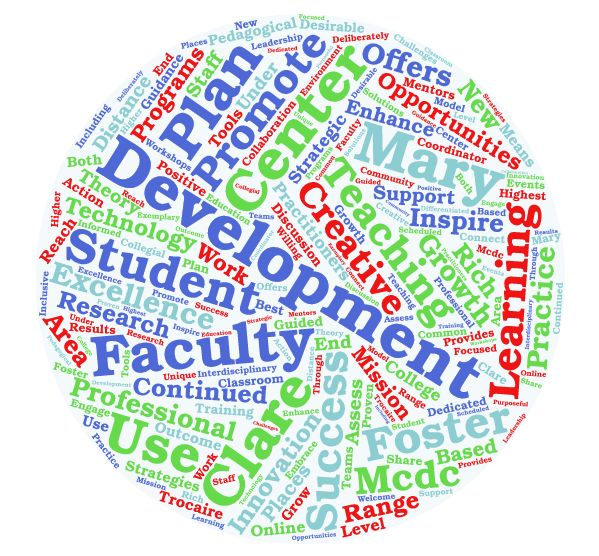Mission of the Mary Clare Development Center
 The mission of the Mary Clare Development Center is to support faculty, promote excellence in teaching, and promote professional development opportunities. The Mary Clare Development Center offers a range of programs to enhance teaching and learning based on pedagogical theory and rich in creativity. The Mary Clare Development Center is a dedicated area that fosters interdisciplinary discussion where faculty can deliberately plan and assess. The Mary Clare Development Center provides training for new technological strategies used in the classroom, in online learning, and in distance learning.
The mission of the Mary Clare Development Center is to support faculty, promote excellence in teaching, and promote professional development opportunities. The Mary Clare Development Center offers a range of programs to enhance teaching and learning based on pedagogical theory and rich in creativity. The Mary Clare Development Center is a dedicated area that fosters interdisciplinary discussion where faculty can deliberately plan and assess. The Mary Clare Development Center provides training for new technological strategies used in the classroom, in online learning, and in distance learning.
The Mary Clare Development Center (MCDC) is guided by the Trocaire College 2020 Strategic Plan which places “student success” at the highest-level desirable outcome. To that end, the Mary Clare Development Center, under the guidance of the Coordinator, will work with faculty, staff, and leadership to reach for excellence and innovation in teaching and learning, inspire continued professional growth, and to foster a community of practice
focused on collegial collaboration and positive results.
Goals
- Connect faculty exemplary practitioners through scheduled events, workshops, action research teams, and opportunities to share successes.
- Engage faculty with research-proven, creative, and innovative solutions to both common and unique challenges in higher education, including the purposeful use of technology tools for teaching and learning.
- Model best practices and an inclusive and differentiated environment so that all are welcome and willing to grow as informed practitioners.
- Inspire faculty to embrace continued growth.
Stop by and visit the MCDC in Main Campus room #460!
Faculty Mentoring
Faculty are encourage to participate in the Trocaire College Mentoring Program. You can find detailed information about mentoring at Trocaire here.
Faculty Development Conclusion
The new direction of The Mary Clare Development Center has been purposefully organized n such as way as to have a far-reaching and positive impact on all stakeholders. The use of a multi-modal approach impacts faculty development, confidence, collaboration, and longevity Faculty will certainly benefit, but the end goal of student success and satisfaction is also addressed. While the approach most certainly impacts faculty and students, the larger goal is also to connect to the 2020 Strategic Plan (2017) and directly and positively impact excellence, presence and visibility, and market agility (2020 Strategic Plan, 2017).
